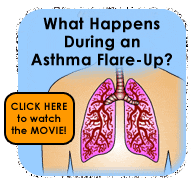What's an Asthma Flare-Up?
Article Translations: (Spanish)
When people have asthma, their airways are always a little swollen or irritated. Airways are the tiny breathing tubes in a person's lungs.
What's an Asthma Flare-Up?
During an asthma flare-up (also called an asthma flare, attack, episode, or exacerbation), asthma problems get worse. Sticky mucus clogs the airways. The muscles around them tighten up. That narrows the breathing tubes. Picture a straw with walls that are getting thicker and narrower, leaving less and less space inside for air to get through.
A person who is having a flare-up might:
- feel tightness in the chest
- cough, wheeze, or have trouble breathing
- have a faster heartbeat
If a flare-up is severe, the person may struggle to breathe even while sitting still. Someone having a severe flare-up may not be able to speak more than few words without stopping to breathe.
Asthma flare-ups can be dangerous — and scary. You have to act fast! Someone having an asthma flare-up might need to take quick-relief medicine, visit the doctor, or even go to the hospital.
Having a set of instructions called an asthma action plan helps you know what to do.
What Causes Asthma Flare-Ups?
Things like smoke or perfume can bring on breathing problems for people with asthma. These are called triggers.
Different people have different triggers. For some people a trigger may be cold air, exercise, or infections (like colds). For others triggers might be allergens like animal dander, dust mites, or mold.
Triggers can cause flare-ups because they make the swelling in the airways worse and increase the amount of mucus. Triggers also can cause the muscles around the airways to tighten, making the airways even narrower.
If a flare-up isn't treated it can last for several hours or even days. Quick-relief medicines (inhalers or "puffers") often take care of the symptoms pretty fast. Most people feel better after a flare-up is over, though it can take several days to completely clear up.
How Can I Spot an Asthma Flare-Up?
You can predict some flare-ups, but it might take a bit of detective work.
Some flare-ups happen suddenly, after a person is exposed to a trigger — like being around someone who is smoking. Flare-ups also happen when problems in the airways build up over time. That can happen when a person's asthma is not well controlled.
Flare-ups need to be treated at their earliest stages. So it's important to know early warning signs (things that someone might notice just before a flare-up happens).
Clues that a flare-up might happen are different for everyone. They might even be different with each asthma flare-up.
Early warning signs include:
- coughing, even if you don't have a cold
- throat clearing
- rapid or irregular breathing
- unusual fatigue
- restless sleep or cough keeping you up at night
- difficulty with exercise
Some doctors tell people with asthma to use a peak flow meter as a way to help predict if a flare-up is on its way.
Can I Prevent Asthma Flare-Ups?
You have the power to prevent flare-ups, at least some of the time. Here's what you can do:
- Always have your inhaler (and spacer, if you use one) with you.
- Stay away from triggers that you know may cause flare-ups. Try to avoid being around smokers — and don't smoke yourself.
- If you use a long-term control medicine, follow your doctor's instructions for taking it every day. Don't skip it or take less because you feel OK.
- Work with your parents and doctor to follow your asthma action plan.
Note: All information is for educational purposes only. For specific medical advice, diagnoses, and treatment, consult your doctor.
© 1995-2024 KidsHealth ® All rights reserved. Images provided by iStock, Getty Images, Corbis, Veer, Science Photo Library, Science Source Images, Shutterstock, and Clipart.com


